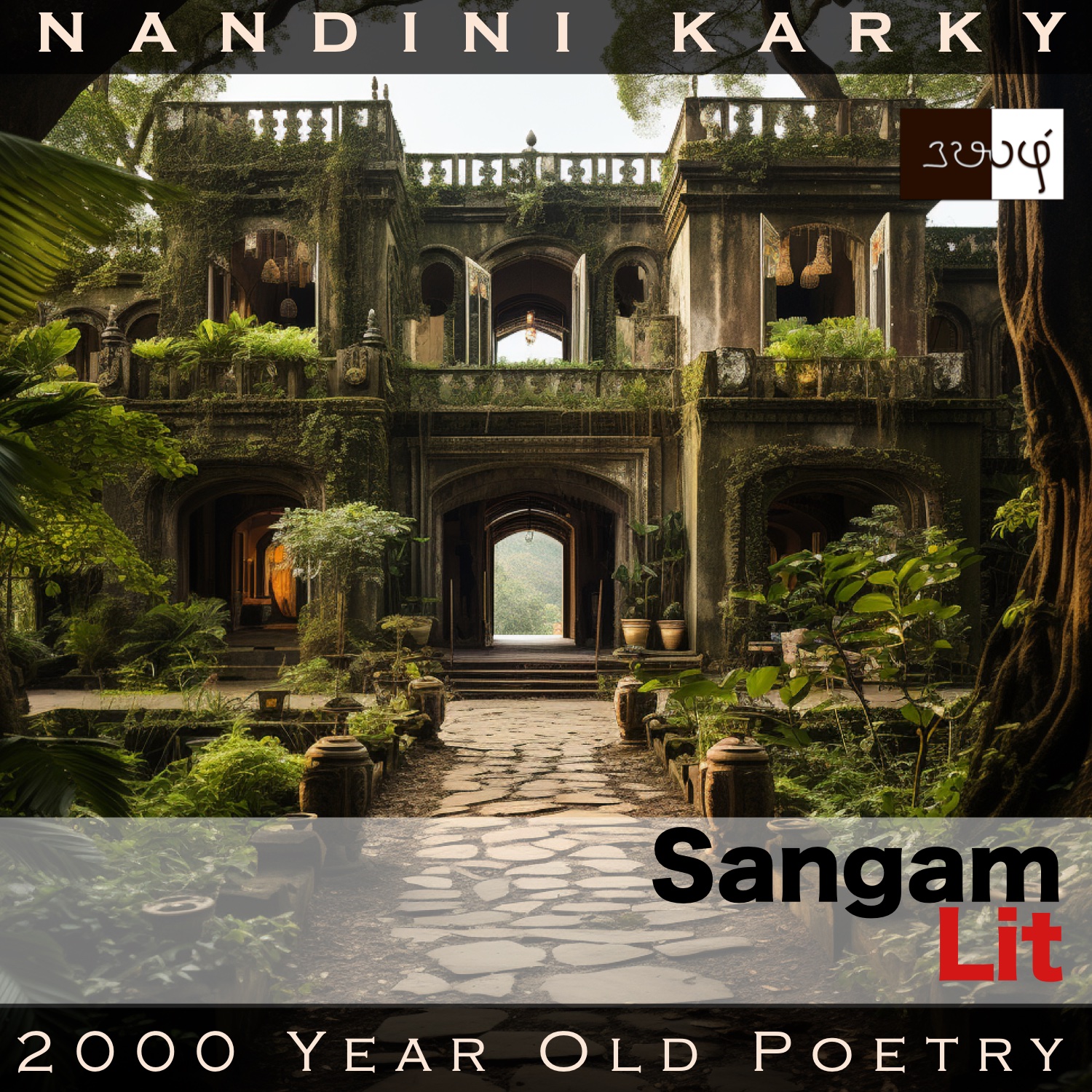Podcast: Play in new window | Download
Subscribe: Apple Podcasts | Spotify | Amazon Music | Android | iHeartRadio | Email | TuneIn | RSS | More
In this episode, we listen to an account of the past glory of a place, as portrayed in Sangam Literary work, Puranaanooru 261, penned by the poet Aavoor Moolankizhaar. Set in the category of ‘Karanthai Thinai’ or ‘Cattle Recovering’, the verse expresses the helplessness felt after the loss of a patron.

அந்தோ! எந்தை அடையாப் பேர் இல்!
வண்டு படு நறவின் தண்டா மண்டையொடு
வரையாப் பெருஞ் சோற்று முரி வாய் முற்றம்,
வெற்று யாற்று அம்பியின் எற்று? அற்று ஆகக்
கண்டனென், மன்ற; சோர்க, என் கண்ணே;
வையம் காவலர் வளம் கெழு திரு நகர்,
மையல் யானை அயாவுயிர்த்தன்ன
நெய் உலை சொரிந்த மை ஊன் ஓசை
புதுக்கண் மாக்கள் செதுக்கண் ஆரப்
பயந்தனை, மன்னால், முன்னே! இனியே
பல் ஆ தழீஇய கல்லா வல் வில்
உழைக் குரல் கூகை அழைப்ப ஆட்டி,
நாகு முலை அன்ன நறும் பூங் கரந்தை
விரகு அறியாளர் மரபின் சூட்ட,
நிரை இவண் தந்து, நடுகல் ஆகிய
வென் வேல் விடலை இன்மையின் புலம்பி,
கொய்ம் மழித் தலையொடு கைம்மையுறக் கலங்கிய
கழி கல மகடூஉப் போலப்
புல்லென்றனையால், பல் அணி இழந்தே.
Verses in this series seem to be fusing the two themes of the loss of a patron and that of recapturing stolen cattle. The poet’s words can be translated as follows:
“Alas, O huge mansion of my lord with wide open gates! Your front yard, whose floor used to be worn out by the ceaseless rendering of bee-buzzing sweet toddy onto the bowls of seekers along with limitless amounts of rice, now stands like a boat in a waterless river. How can this be? I have now seen you barren. Let my eyes be ruined!
Akin to the huge sigh of musth elephants in the esteemed and prosperous mansions of those who protect the land, here the sounds of fleshy meat being cooked on a hot pan coated with ghee were heard then and you used to render this, brightening eyes of newcomers to the mansion before!
Now, giving chase to those who captured many cattle, carrying a well-trained sturdy bow in hand, as the ominous sounds of an owl resounded, and as dictated by the tradition of the wise who have much prudence, wearing fragrant flower clusters of the ‘karanthai’, which look like the udders of young cows, he brought back the entire cow herd here, and ended up a memorial stone. Akin to his widowed wife, shorn of all ornaments, with a newly shaved head, who mourns and laments the absence of that white-speared young man, you too have become listless, losing the lustre of your beauty!”
Let’s explore the details herein. Taking a different approach, the poet addresses the house of a patron here. In the very first line, the poet establishes the boundless generosity of that patron by saying the gates of his house were never shut, standing always ajar, welcoming anyone passing that way. Next, the poet turns his focus on to the floor of the front yard, which is worn out by countless people, who stood there with their begging bowls brimming with sweet toddy and rice too. He declares the current dilapidated state of that floor with the illustrative image of a boat resting on a river bereft of its flowing water. Seeing this sight, the poet declares his eyes must be cursed indeed. Then, he turns to auditory imagery and makes our ears hear the sound of sighing elephants in the mansions of mighty kings. This is the exact sound that used to emanate from this mansion, not from elephants but from the sound of meat being fried in hot ghee, declares the poet.
Turning from the wondrous past to the present, the poet talks about the event of this village’s cattle being stolen by others, and how this patron, went there with a bow in hand, employing the wise strategies and traditions of the knowledgeable. One such tradition when going to recapture cattle was the wearing of ‘Karanthai flowers’, known commonly as the ‘East Indian globe thistle’. Offering an intricate plant-animal connection, the poet talks about how the flower of this plant look like the udder of a cow – something you will appreciate when you search for an image of this interesting medicinal flower. Reverting, the poet continues the tale of how the leader had gone to recapture those cattle, succeeded in his mission but lost his life in the process and became a memorial stone. Then, he goes on to compare the dull, current state of the mansion to the appearance of the man’s wife, who has lost her past lustre, owing to the widowhood customs of shaving her head and removing her ornaments. And thus, the poet talks about how the joy and wealth of many depended on one person’s life and the indirect evidence for patriarchy in those harsh customs of widowhood. However, even amidst these difficult sociological truths of then, the poet manages to infuse this song on death with unique visuals such as an abandoned boat on a riverless bed and the enchanting sounds of food being cooked, thus making a past moment throb with life in the present!




Share your thoughts...